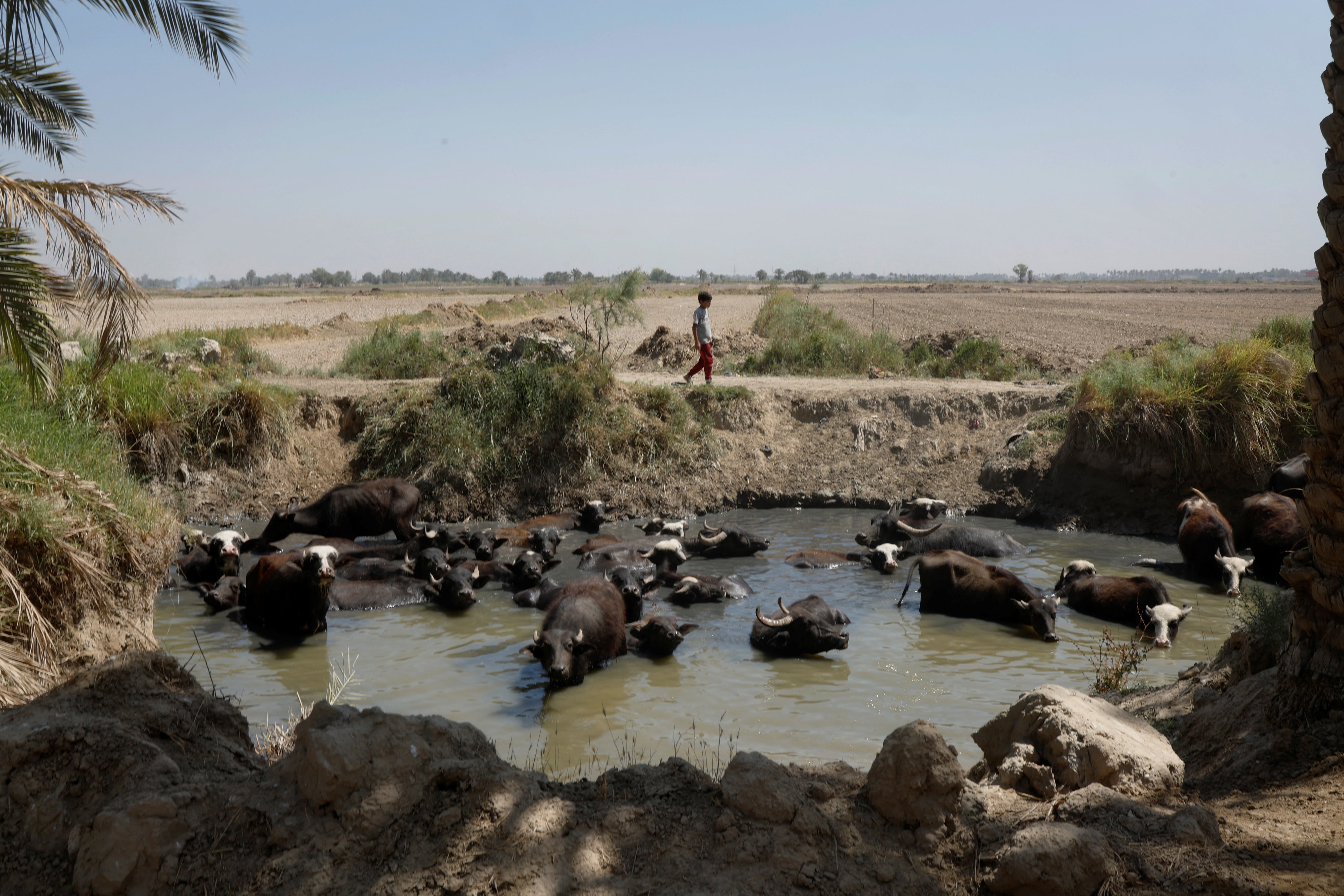Drought imperils Iraq’s water buffalo and a child’s way of life
Farmers are unsure what the future holds in the ‘fertile crescent’ they have relied on for generations

Petting a water buffalo before tying a fodder bag around its neck, Mustafa Ahmed, 13, tends his father’s herd in Iraq’s southern province of Najaf where his family have raised animals for generations, but lack of water now threatens their livelihood.
Iraq forms part of the “Fertile Crescent”, land sweeping from the Mediterranean to the Persian Gulf which has been farmed for thousands of years. But the landscape has been devastated by upstream damming of Iraq’s two main rivers, the Tigris and the Euphrates, lower rainfall trends and decades of conflict.
Ahmed’s father, Ahmed Abdul Hussein, said the dire water shortage in their home Al-Mishkhab district is forcing him to sell their animals one by one – heartbreaking for his son.
They recently lost a two-month-old calf. “It hurts that one of them died... I really love them”, the 13-year-old said. “Now we have nine left.”
Last year they had 20.
The situation is even worse in Iraq’s southern marshes which were already in a fragile state and are now experiencing the most severe heat wave of the last 40 years. Almost 70 per cent of the marshes are devoid of water, according to the UN Food and Agriculture Organisation (FAO).
Shemal said water flows on the Euphrates and Tigris rivers have decreased by about 70 per cent this year compared to previous decades.
In Al-Mishkhab the landscape has become barren and Abdul Hussein’s animals must brave the dust blowing from abandoned farmland with scant water to keep cool.
“This water is stale,” said Abdul Hussein, pointing at his animals standing in stagnant water. “They are suffering from thirst.”
In addition to the lack of water, a drastic decline in crop production and a rise in the price of fodder has left farmers struggling to feed water buffalo.
According to the FAO, across Iraq only about half of the land cultivated in 2020 is now being tended. In Najaf province, the situation is even more extreme – only 5 per cent of 2020’s growing area is being used after rice planting was almost completely halted due to lack of water.
Herders like Abdul Hussein used to farm patches of land themselves, or source cheap fodder from rice farmers.
“When the buffalo doesn’t eat ... it does not produce milk,” said Abdul Hussein, adding his income had shrivelled without his main source of earnings, and he struggles to afford the now much more expensive, often imported, fodder.
“A few more months and it might all be over,” he said, as the sun set over Al-Mishkhab.
The International Organisation for Migration (IMO) says that as of last year, 62,000 people had been displaced across Iraq due to drought. Many moved from the countryside to cities with high unemployment rates and poor services.
About 7 per cent of minors aged 5-17 years are engaged in child labour in Iraq, according to Unicef.
Ahmed said he wanted to go back to school after seeing his animals disappear one by one. As he does not know how to read or write, his father fears his future prospects are slim.
“The fate of our lifestyle is unknown. We don’t know what lies ahead,” said Abdul Hussein.
Photography by Alaa Al-Marjani
Reuters
Subscribe to Independent Premium to bookmark this article
Want to bookmark your favourite articles and stories to read or reference later? Start your Independent Premium subscription today.

Join our commenting forum
Join thought-provoking conversations, follow other Independent readers and see their replies